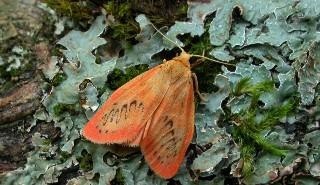May 23 2022Reviewed by Alex Smith
Moths are battling to shift north to adapt to climate change in the United Kingdom could be supported by spotting areas where habitat restoration could offer them a seamless journey.

Image Credit: University of Reading.
A new study performed by the University of Liverpool, Rothamsted Research, Butterfly Conservation, and the University of Reading integrated real data collected by volunteers with new computer simulations initially to forecast the movement of various moth species in a changing climate.
Such forecasts showed that farmland and suburban moths (vital for both pollination and as food to help bats and birds), battled to move across landscapes. It assisted the researchers in determining landscape features, like rugged hills, which tend to slow their movements.
These new computer models will help us to target habitat restoration in the most effective places to help species adapt to climate change by shifting their ranges across the country.
Dr Jenny Hodgson, Study Lead Author, University of Liverpool
Professor Tom Oliver, an ecologist at the University of Reading and a co-author of the study, stated, “Previous research has shown how severe fragmentation of habitats in our UK landscapes is preventing the ability of species to shift their ranges in response to climate warming. We urgently need targeted habitat restoration to help species adapt to climate change.”
“Utilizing predictions like these would enable us to effectively create moth motorways, helping endangered moth species reach new, more suitable regions more quickly in their bid to survive.”
There is extensive concern that UK wildlife will fail to combat climate change if the habitat is too rare or insufficiently linked. But so far there has been a lack of capacity to forecast the movement of species throughout landscapes under climate change.
The study performed discovered that moth species discovered in suburban and farmland habitats were moving northwards in only a few British landscapes, thereby posing a risk to the species.
The study was recently published in the Global Change Biology journal on May 20th, 2022
The research group discovered that landscapes with hills or modifying temperatures served as bottlenecks, thereby decreasing the movement of suburban moths and farmland. The causes for this are yet to be understood clearly, although it might be that hills present a physical barrier to dispersal, or that upland area consists of fewer nectar sources, hedgerows, and larval food plants.
Data on the movement of 54 southerly-distributed moth species from 1985 onwards was collected from the Rothamsted Research Light trap network and the National Moth Recording Scheme to test outcomes from computer modeled data.
The restricted expansion of farmland moths is surprising and shows it is not safe to assume that such relatively tolerant species face no geographical barriers to range expansion. There may be ways to adapt farming practices to improve species ability to move through these landscapes.
Dr Chris Shortall, Study Co-Author and Entomologist, Rothamsted Research, University of Reading
Dr. Zoë Randle, the Senior Survey Officer at Butterfly Conservation and a co-author of the study, said: “The findings from this work have great potential to maximize the impact of conservation action, habitat restoration and tree planting by targeting these environmental enhancements in the right places.”
Randle added, “We are in the grip of a biodiversity and climate crisis, time is of the essence and the findings of this research can really help make a difference in helping moths and other species in these communities that are undergoing range expansion due to climate change.”
Journal Reference:
Hodgson, J. A., et al. (2022) Where and why are species' range shifts hampered by unsuitable landscapes? Global Change Biology. doi.org/10.1111/gcb.16220.
Source: http://www.reading.ac.uk/